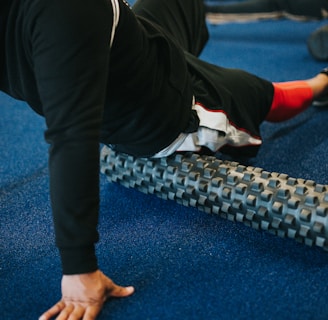Recover. Rebuild. return stronger. Personalized care for sports recovery, injury prevention, and maternal wellness
The Impact of Overtraining: How to Avoid Injuries from Pushing Too Hard
Overtraining happens when the body is pushed beyond its ability to recover, leading to fatigue, increased injury risk, and mental burnout. To avoid overtraining, it's essential to incorporate rest, vary workouts, prioritize recovery, and listen to your body. Gradual progressions, proper nutrition, and hydration are also key to maintaining a sustainable and injury-free workout routine.
By Desiree L. Yllan, DC, CCSP
2/10/20252 min read


Overtraining occurs when an individual pushes their body too hard without allowing adequate time for rest and recovery. While consistent training is essential for progress, the balance between exertion and recovery is crucial to avoid overtraining, which can have serious consequences for both physical and mental health.
What Causes Overtraining?
Excessive intensity or frequency: Intensive interval training, a sudden increase in training or prolonged heavy monotonous training without enough rest.
Lack of recovery time: Inadequate time off to recover in between intense training days.
Not varying workout types: Constantly doing the same activities (which puts repetitive strain on the same muscle groups).
Insufficient nutrition or hydration: Not drinking/eating enough calories replenish the body’s energy stores after intense workouts.
Inadequate sleep: Poor-quality rest, which is essential for muscle repair and recovery.
Symptoms of Overtraining
Physical Symptoms:
Persistent Fatigue: Feeling tired or worn out despite regular rest, and lack of energy during workouts.
Decline in Performance: Difficulty achieving personal bests or even performing basic exercises due to physical exhaustion.
Sleep Disturbances: Trouble falling asleep or staying asleep, leading to poor recovery.
Increased Soreness: Muscles feeling sore for prolonged periods, even after light activity or rest.
Weakened Immune System: Overtraining can lower the immune system, leading to frequent infections
Dehydration: Increased need for hydration due to excessive sweating combined with inadequate recovery.
Mental Symptoms:
Irritability or Mood Swings: The physical exhaustion from overtraining can lead to emotional instability and increased stress.
Loss of Motivation: A decrease in the desire to train or a lack of enjoyment in physical activity.
Anxiety or Depression: Mental burnout and overtraining can contribute to mental health issues like anxiety or depression.
How to Prevent Overtraining
Rest and Recovery: Ensure that your body gets adequate rest between intense workouts. This means incorporating rest days into your training schedule, particularly after high-intensity sessions.
Vary Workouts: Alternate between different exercises or training modalities to prevent repetitive strain on the same muscle groups. This helps prevent burnout and promotes balanced muscle development.
Listen to Your Body: Pay attention to how your body feels during and after exercise. If you’re consistently feeling tired, sore, or unmotivated, it may be time to take a step back and allow for recovery.
Get Enough Sleep: Sleep is when the body recovers and repairs itself. Aim for 7-9 hours of sleep per night to ensure your body has enough time to regenerate.
Hydration and Nutrition: Proper hydration and eating a well-balanced diet rich in protein, carbs, fats, and micronutrients are essential for fueling your workouts and aiding recovery. Ensure you are replenishing your body’s energy stores.
Cross-Training: Incorporate cross-training activities, such as swimming, cycling, or yoga, into your routine to improve flexibility, strength, and cardiovascular endurance without overloading specific muscle groups.
Gradual Progression: Increase the intensity or duration of your workouts gradually. Avoid jumping into high-intensity training too quickly, as it can overwhelm your body and lead to injury.
Treatment of Overtraining
If you’re experiencing symptoms of overtraining, it’s essential to rest and allow your body time to recover. Here are a few steps you can take:
Take a Break from Intense Training: Reduce the intensity or duration of your workouts, or take a short break entirely from intense exercise to allow your body to recover. Sometimes you made need to take up to two weeks off.
Consult a Healthcare Provider: If injuries or symptoms persist, consulting with a doctor, chiropractor, or physical therapist can help address any physical issues and develop a recovery plan.
Focus on Recovery Techniques: Utilize foam rolling, stretching, and low-intensity activities like walking or yoga to promote blood flow and muscle recovery.
Reevaluate Your Training Program: Once you’ve recovered, adjust your training program to include more rest days, varied workouts, and balanced nutrition.
Specializing in sports, prenatal wellness, and postnatal recovery.
Recover. Rebuild. Revitalize.
contact us:
info@lunawellstudio.com
424-262-3107
© 2024. All rights reserved.

